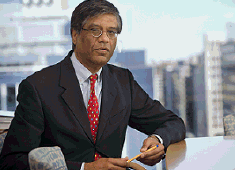
Typical street scene in Santa Ana, El Salvador. (Photo: iStock)
IMF Survey: IMF's Focus Is on Securing Recovery, Anchoring Future
November 21, 2012
- Work program centers on restoring stability, reducing vulnerabilities
- Work under way to address legacy issues of high debt, weak financial systems, slow growth, and high unemployment
- Key priority to ensure long-term financing for loans to low-income countries
Against the backdrop of a still weak global economic outlook, the IMF’s work agenda for the coming months is designed to support bold policy implementation to secure the economic recovery and anchor the future—the key themes of Managing Director Christine Lagarde’s Global Policy Agenda presented at the IMF’s recent annual meetings in Tokyo.

Workers line up outside a government employment office in Madrid, Spain. Addressing unemployment is a key objective of the IMF’s work program (photo: AFP/Dominique Faget)
IMF WORK PROGRAM
The Executive Board’s semiannual discussion of the IMF’s work program focused on translating the directions laid out in the Global Policy Agenda into a specific plan for the 188-member institution over the next twelve months.
In addition to supporting recovery from the global economic crisis, the work program emphasizes the need to both tackle legacy issues of the crisis—high debt, slow growth and high unemployment, and financial sector repair—and to strengthen the international monetary system through regulatory reform for financial systems, and by addressing global imbalances and spillovers.
IMF Survey, the IMF’s online news magazine, spoke with Siddharth Tiwari, Director of the Strategy, Policy, and Review Department, about the key components of the work program.
IMF Survey online: What is the IMF doing to secure the recovery and restore stability, a key priority in the months ahead?
Tiwari: The IMF’s efforts in coming months will focus on assisting the membership in dealing with the immediate priorities.
• In the euro area, we will continue to engage with members to help build support for pan-European policies and to ensure the success of country programs underway. The latter increasingly depend on supportive euro area-wide policies being in place.
• In the United States, our analysis and policy advice will continue to highlight the risks and spillovers from the fiscal cliff.
• In emerging market economies, the focus of our policy advice is on potential spillovers from outside. Where strong policy frameworks are in place, this could also include financing through either precautionary or disbursing agreements.
• In low-income countries (LICs), we are engaging proactively with members to help them weather adverse external conditions through intensive policy support, enhanced capacity building, and concessional financing.
• In the Middle East, we will continue to support the economic transition of Arab countries, through policy advice, technical assistance and financial support as appropriate.

Siddharth Tiwari, Director of the Strategy, Policy, and Review Department (photo: IMF)
IMF Survey: A topic of much interest is how countries deal with high debt in an environment of low growth. How will the IMF take this work forward?
Tiwari: In many advanced economies, debt levels are over 100 percent of GDP—a level last seen in war times. Bringing debt levels down, while not derailing or delaying economic recovery, requires action on two tracks:
• First, fiscal policy formulation and implementation. Many countries—including the United States, Japan, and other advanced economies—need to develop credible medium-term fiscal strategies and strengthen fiscal institutions to improve management of public resources. We are assisting these efforts through both policy advice in the context of our bilateral and multilateral surveillance as well as technical support where appropriate. Other work under way is designed to address specific fiscal issues—in particular, the energy subsidies that are a substantial drain on budgets in many countries while not necessarily achieving their objectives of protecting the poor.
• Second, early identification of vulnerabilities. We are further enhancing debt sustainability analysis to capture the vulnerabilities arising from both the public and the private sectors and linkages between sovereign and financial risks.
IMF Survey: The IMF is planning a study on the impact of the crisis on the conduct of monetary policy. What issues will this study address?
Tiwari: The unconventional monetary policies in place in several advanced economies have generated a number of important policy questions.
The list is long: how to implement monetary policy in a context of widespread financial sector vulnerabilities and poorly functioning financial markets; what monetary policy tools are effective at the zero-level bound; what are the risks of prolonged monetary accommodation; how to exit from extraordinary monetary support; and how have such policies impacted other countries, such as the emerging market economies.
IMF Survey: Strengthening financial systems is central to achieving a stable global economy. How will the IMF’s agenda in this area build on work done previously?
Tiwari: The IMF’s work in this area will be guided by the priorities established in the Financial Surveillance Strategy approved in September. The strategy has three pillars: improving risk identification and macrofinancial policy analysis; upgrading and better integrating the instruments and products of financial surveillance (such as Article IV consultations and the Financial Sector Assessment Program); and increasing the traction of our financial surveillance.
A particular focus in the period ahead will be to enhance understanding and application of macroprudential tools—not only the tools themselves, but their interaction with monetary policy instruments.
We continue to work with the Financial Stability Board and other stakeholders on the global regulatory reform agenda, including by analyzing potential unintended consequences of uncoordinated national initiatives, such as proposals to limit the size or activities of financial firms.
IMF Survey: Unemployment is stubbornly high in many parts of the world. What is the IMF doing to help boost jobs and growth?
Tiwari: Global growth has fallen well short of the level needed to bring unemployment down to more acceptable levels, or even to just absorb new entrants onto labor markets. We need to see a recovery in growth that is both sustained and creates jobs.
The IMF has established an Interdepartmental Working Group, chaired by Deputy Managing Director Min Zhu, with the objective of identifying policies to support inclusive growth and articulating a Fund approach to growth and labor markets issues.
Several papers have already been produced, including on Europe and other areas. Additional work on the determinants of long-term growth in the face of structural shifts in the global economy—demographic changes for example—is under way.
IMF Survey: The crisis in advanced economies has garnered a lot of attention recently, but how is the IMF supporting its low-income members?
Tiwari: Many low-income countries have continued to see strong economic outcomes. But continued weakness in growth in the advanced economies and slowing growth in some of the major emerging market economies raise the risk of adverse external conditions at a time when many developing countries have limited policy buffers.
The key role for the IMF is therefore to continue to support countries to design macroeconomic frameworks that will help rebuild policy buffers while supporting their development objectives including, for example, through strengthening financial surveillance to promote financial deepening and improving the management of natural resource wealth.
Fund financing will remain important for many poorer countries. All concessional loans extended during the crisis have, on an exceptional basis, been extended at a zero percent interest rate. While we continue to refine our concessional facilities so that they best fit the evolving needs of low-income countries, a key priority is to ensure that financing is in place to provide for the long-term self-sustainability of those facilities.
A strategy has been approved, with a key component being the transfer of 90 percent of the envisaged distribution of $2.66 billion of gold windfall profits to the Poverty Reduction and Growth Trust (or an equivalent contribution). An earlier distribution of $1.06 billion already received the necessary approvals from members, and we urge the membership to provide the necessary approvals for this second distribution.
IMF Survey: What are the next steps in the IMF’s governance reform?
Tiwari: We are close to the completion of the 2010 quota and governance reforms—the requisite consents for the quota increase have been received and the required number of member acceptances for the Board Reform Amendment have been met, so that the reforms will become effective once acceptances have been received from members holding 85 percent of voting power (as of November 9 we were at 69.4 percent of voting power). We will continue to report monthly to the Board on the status of votes.
The reform of Fund governance—vital for ensuring that the IMF continues to be representative of the membership—is an ongoing process.
The next key step is the completion of the quota formula review scheduled for January 2013 ahead of the 15th General Review of Quotas which is to be completed by January 2014. The quota formula review is well underway with Board discussions scheduled for the end of this month as well as in January.


